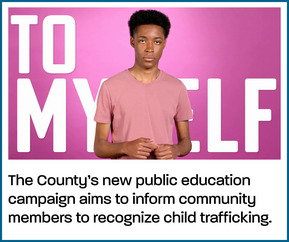Child trafficking can happen anywhere
In the course of her work, Adela Estrada has interfaced with and supported hundreds of children and youth of all genders, ranging in age from nine to 21, who are victims of commercial sexual exploitation or sex trafficking.
Yet, many people in Los Angeles County remain unclear about what child trafficking is, where it happens or who it affects.
Estrada, who oversees the Commercially Sexually Exploited Children Program for the Department of Children and Family Services, explains that a common misconception is that child trafficking mainly or only occurs in other countries. The reality is that human trafficking has been reported in every state across our nation, and Los Angeles County is one of the top hubs for sex trafficking in the U.S.
“You can see obvious signs of commercial exploitation if you know where to look and what to look for,” Estrada said.
Recognizing the need for more public education on this important topic, the Los Angeles County Office of Countywide Communications recently kicked off a new campaign, Know to Say No, which delivers a sobering message: Child trafficking can happen anywhere.
The campaign includes a webpage and a series of short videos featuring young professional actors speaking to friends, family, teachers and community members. Countywide Communications and the Los Angeles County Child Trafficking Committee, which Estrada chairs, worked with other County departments, law enforcement officials, educators, and advocates to develop the campaign’s key messages.
“We should be kids just having fun,” says a solitary teen onscreen, an earnest look on his face as he speaks to his friends through the camera. “But things are crazy now,” he adds.
Candidly speaking to himself, another young person says, “I would tell myself to pay attention because things that happen to other people — they can happen to me.”
The simple yet powerful videos place young people at the forefront of the prevention effort, reminding viewers that any child can become a victim.
While certain risk factors make some youth more vulnerable than others, experts agree that child predators don’t discriminate based on age, race, gender, sexual orientation or socioeconomic status.
Learn how to recognize the signs of child trafficking
Estrada, who is working diligently to advance the new human trafficking public education campaign, said the number of sexually exploited youth referred to DCFS has quadrupled in the past decade. Currently, DCFS is serving approximately 380 youth impacted by commercial exploitation. About 90% of those referred to the program are female, 80% are youth of color, more than 50% are age 16 or older, and nearly 20% are between the ages of nine and 13. These figures highlight the importance of early prevention efforts.
According to the KTSN webpage, behavioral signs of child trafficking may include:
-Running away from home or school frequently.
-Sharing nude or explicit pictures or information online.
-Giving a false name or age when asked for personal information.
-Having expensive items that youth are unable to afford.
-Spending time in places where sex trafficking happens like hotels, streets or specific addresses.
The webpage also details the predatory tactics that traffickers use to groom potential victims such as masquerading as a romantic interest and giving gifts, money, or anything of value to the youth to meet their needs and build trust. Some may even post fake ads that offer modeling jobs or other opportunities.
You can help keep young people in your community safe
The KTSN campaign seeks to inform and empower community members with free digital and social media content that may be used to help share the message. Social media posts, videos, banners and display ads are available on www.KnowToSayNo.com.
“We know the devastating trauma caused by human trafficking and the lifelong impact it can have, especially for children and youth,” Estrada said. “We want more people to know the signs and learn what to do if they suspect a child is a possible victim.”
Suspicions of abuse or neglect, including child sex trafficking, should be reported to the LA County Child Protection Hotline at (800) 540-4000 or 911.
Like this:
Like Loading...
Related





 Tweet This
Tweet This Facebook
Facebook Digg This
Digg This Bookmark
Bookmark Stumble
Stumble RSS
RSS


























REAL NAMES ONLY: All posters must use their real individual or business name. This applies equally to Twitter account holders who use a nickname.
0 Comments
You can be the first one to leave a comment.